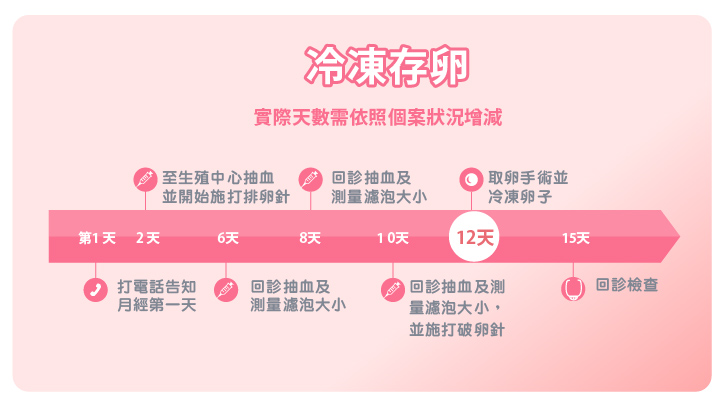冷凍精卵流程
近年來由於台灣婦女們的結婚年齡越來越晚,導致年齡因素成為不孕症最常見的原因之一。
年齡是造成卵子數量變少,卵子品質不佳的最大因素,我們的生殖醫學科技到目前為止都無法透過吃藥或是打針的方法來延緩卵巢的老化,女性年齡越大,卵巢的染色體異常率也越高,這個現象的嚴重程度不容小覷,你知道42歲以上婦女的卵子,每10顆中到底有幾顆的染色體是正常的呢?答案是只有2顆,根據統計,40歲以上的婦女,其卵子染色體異常率高達70%。然而,許多邁向高齡的女性現階段沒有生育的打算,但未來又希望可以擁有自己的小孩,選擇將自己的卵子先冷凍保存起來,因此卵子冷凍在台灣越來越熱門,冷凍起來的卵子沒有使用期限,也可以視為一種財產,只要擁有者還活著,她就可以使用她的卵子。
到底哪些人需要冷凍卵子呢?
1. 即將進入高齡而未生育之婦女
2. 卵巢庫存量較少的婦女
3. 子宮內膜異位症的患者
4. 卵巢腫瘤接受手術、化療、或放射線治療前。
5. 擁有卵巢早衰家族史的女性
在冷凍存卵時,因為每個人的年齡不同,卵子庫存指標也不一樣,所以每次療程可以存到的卵子也因人而異,在刺激卵子濾泡時會依照每個人對排卵藥的反應而有不同數量的濾泡產出,原則上越年輕,AMH(抗穆勒氏賀爾蒙)越高,所存到的卵子越多。35歲以下的女性通常在一次的存卵療程中平均可取出10~20卵子,但40歲以上的婦女由於卵巢功能衰退,通常一次療程只能取到5顆左右的卵子,當然也是可以選擇多存幾次,收集較多的卵子以供未來使用。
存卵所需使用的藥物劑量與刺激天數與年齡相關,婦女越年輕,卵巢狀況越好,所需要的藥物劑量與刺激天數就越低,花費相對也越少,至於懷孕率,也會依當時存卵的年齡而有所差別,卵子越年輕,懷孕率越高。因此,冷凍卵子的時機點,越年輕越好。
至於要排卵藥會不會引響到卵巢呢?基本上用人工的方式打針或是吃藥並不會提早更年期的發生,卵巢中卵子的數量是在媽媽肚子裡就已經決定了。通常正常女性一生會有大概400萬顆卵子,月經開始後,每一週期會有7 到10顆卵子被刺激起來,但最後只會有1顆卵子成熟且被排出來,其他未成熟的卵子會自行萎縮,我們可以將它們視為陪跑的卵子,因此我們用排卵口服藥或是排卵針提供足夠的荷爾蒙讓這些原本應該會萎縮掉的卵子一同長大成熟,好讓我們將它取出來,並不會改變原本卵子的消耗量,所以排卵刺激並不會提早更年期的時間。
 我想進一步諮詢
我想進一步諮詢
